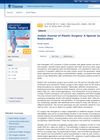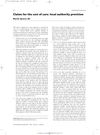 7 citations,
June 1992 in “The Journal of Dermatologic Surgery and Oncology”
7 citations,
June 1992 in “The Journal of Dermatologic Surgery and Oncology” Hair transplantation is a viable treatment for some types of female hair loss, with careful donor assessment and attention to psychological factors.
 5 citations,
November 2011 in “Expert Review of Dermatology”
5 citations,
November 2011 in “Expert Review of Dermatology” The document concludes that early diagnosis and a comprehensive treatment plan are crucial for managing hair loss in children, with a focus on both medical and psychological support.
[object Object]  14 citations,
January 2013 in “International Journal of Trichology”
14 citations,
January 2013 in “International Journal of Trichology” Treating hair loss requires a comprehensive approach that addresses both physical and emotional aspects, with a focus on diagnosis, patient education, and good communication.
 5 citations,
March 2011 in “Journal of pediatric health care”
5 citations,
March 2011 in “Journal of pediatric health care” The girl with autoimmune hair loss might regrow hair within a year, and treatments can help but not prevent recurrence; dermatologist referral and corticosteroids are recommended.
 1 citations,
January 2017 in “International Journal of Trichology”
1 citations,
January 2017 in “International Journal of Trichology” Psychological stress and personal history are significant factors in hair loss.
 July 2018 in “British Journal of Dermatology”
July 2018 in “British Journal of Dermatology” Mindfulness reduces anxiety and depression in skin disease patients; dermatologists and psychiatrists often lack confidence in treating psychodermatological conditions.
 May 2017 in “InTech eBooks”
May 2017 in “InTech eBooks” Early treatment of children's hair loss, which can be caused by various factors, is important due to its emotional impact.
 July 2022 in “Nigerian journal of medicine : journal of the National Association of Resident Doctors of Nigeria”
July 2022 in “Nigerian journal of medicine : journal of the National Association of Resident Doctors of Nigeria” Androgenetic Alopecia (AGA) greatly lowers quality of life, causing stress and low self-esteem, with those seeking treatment experiencing more impairment.
 6 citations,
May 2017 in “InTech eBooks”
6 citations,
May 2017 in “InTech eBooks” Hair loss can cause serious mental health problems and treating it requires a team of experts.
 12 citations,
May 1989 in “Postgraduate Medicine”
12 citations,
May 1989 in “Postgraduate Medicine” The document concludes that hair loss is common and can be treated with medications like minoxidil or surgical options, and it significantly affects people's psychological well-being.
 32 citations,
January 2018 in “American Journal of Clinical Dermatology”
32 citations,
January 2018 in “American Journal of Clinical Dermatology” Hormone therapy affects hair growth in transgender individuals, with testosterone potentially causing hair loss in trans men and estrogen reducing facial/body hair in trans women; treatment options vary.
 October 2021 in “Indian Journal of Plastic Surgery”
October 2021 in “Indian Journal of Plastic Surgery” Hair transplant techniques have improved and become less invasive over time, but there are concerns about unregulated centers. The market is growing, with potential for more growth in India due to increasing hair loss cases. New technologies like robotic transplants are promising for the future. Surgeons are encouraged to prioritize patient safety and understand the science behind their techniques.
 1 citations,
February 2021 in “Journal of Dermatological Treatment”
1 citations,
February 2021 in “Journal of Dermatological Treatment” Artificial hair implants can quickly improve looks and life quality, but they have risks like infection and early fiber loss, so more research is needed to confirm their safety and effectiveness.
 July 2018 in “Elsevier eBooks”
July 2018 in “Elsevier eBooks” Telogen Effluvium is a common, usually reversible hair loss condition, often improved by removing the trigger and possibly treated with various products, though their effectiveness is uncertain.
 1 citations,
March 2015 in “Journal of Visualized Experiments”
1 citations,
March 2015 in “Journal of Visualized Experiments” Researchers developed a new, precise method to measure hair loss in mice using image analysis.
 9 citations,
June 2011 in “International Journal of Cosmetic Science”
9 citations,
June 2011 in “International Journal of Cosmetic Science” The new mild shampoo helped prevent hair loss in the subjects.
 January 2023 in “Journal of pharmacognosy and phytochemistry”
January 2023 in “Journal of pharmacognosy and phytochemistry” Herbal home remedies can effectively treat hair loss with fewer side effects.
 26 citations,
January 2019 in “Expert Opinion on Investigational Drugs”
26 citations,
January 2019 in “Expert Opinion on Investigational Drugs” New treatments for hair loss show promise, but more research is needed to confirm their safety and effectiveness.
 50 citations,
December 2010 in “Bjog: An International Journal Of Obstetrics And Gynaecology”
50 citations,
December 2010 in “Bjog: An International Journal Of Obstetrics And Gynaecology” South Asian women with PCOS experience more psychological distress and have a poorer quality of life, especially in social relationships, with hirsutism affecting them more than obesity.
 16 citations,
November 2015 in “International Journal of Dermatology”
16 citations,
November 2015 in “International Journal of Dermatology” Alopecia greatly lowers the quality of life for South African Black women, especially affecting their self-image and social interactions.
 April 2024 in “ScienceRise. Pharmaceutical science”
April 2024 in “ScienceRise. Pharmaceutical science” Men with hair loss feel it affects their emotions and life quality, and want more effective treatments.
 36 citations,
January 2010 in “Human & experimental toxicology”
36 citations,
January 2010 in “Human & experimental toxicology” Eating paradise nuts led to selenium poisoning, causing nausea, hair loss, and other symptoms in two women.
 1 citations,
December 2023 in “Curēus”
1 citations,
December 2023 in “Curēus” Alopecia significantly impacts mental health and quality of life, requiring psychological support.
 52 citations,
March 2016 in “JAMA dermatology”
52 citations,
March 2016 in “JAMA dermatology” Patients with PCOS rate their hirsutism higher than clinicians, and these self-ratings are more closely related to their quality of life and risk of depression.
 3 citations,
August 2023 in “Drug safety”
3 citations,
August 2023 in “Drug safety” Proactive monitoring and management are essential to maximize the benefits of Trastuzumab Deruxtecan while minimizing serious side effects.
11 citations,
January 2010 in “Springer eBooks” [object Object]  16 citations,
March 2016 in “Clinical ophthalmology”
16 citations,
March 2016 in “Clinical ophthalmology” Bimatoprost is safe and improves eyelash growth in healthy kids but not in those with eyelash loss from chemotherapy or alopecia.
 July 2007 in “Clinical Risk”
July 2007 in “Clinical Risk” The claimant sued for negligence after a hair treatment caused harm and distress, and the defendant responded after legal action started.
 March 2023 in “The primary care companion for CNS disorders”
March 2023 in “The primary care companion for CNS disorders” Dengue fever can cause hair loss that may lead to serious psychological issues like Body Dysmorphic Disorder in young women.
 75 citations,
June 1999 in “Pediatric Clinics of North America”
75 citations,
June 1999 in “Pediatric Clinics of North America” The document concludes that early recognition and treatment of PCOS in adolescents is crucial for managing symptoms and long-term health risks.





























